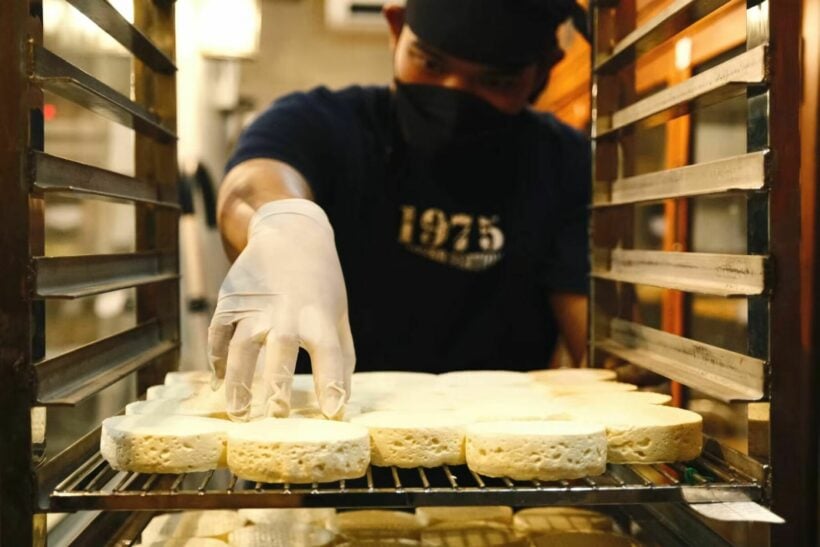Thailand’s top cheesemaker toasts his own success

When Thailand’s top cheesemaker Jarutat Snidwongse Na Ayuthaya decided to make cheese for a living, he didn’t find much support. His family and friends doubted that was a market for Chiang Mai cheese. Thailand’s unique cuisine doesn’t find much space for dairy. Sixteen years on, and things could hardly be better in the small but perfectly formed Thai cheese cottage industry.
Jarutat – Jart to his friends – is one of a blessedly small number of Thai cheesemakers. There is no market for mediocre craft cheese in Thailand nor anywhere else, so bad cheesemakers don’t last very long, and today, Jat can be considered among the very best.
He has 11 kinds of cheese on his board, including Thailand’s first blue cheese, Royal Bleu, aged in a nearby cave. San Praquanburie is a kind of brie made from San Praquan district milk, and La Laboure is a semisoft variety named for one of the first French diplomats in the kingdom. His Hidden Agenda is smoked over wood chips, and Palazzo di Palma, a parmigiano-style hard cheese, is named after the Palace of the Palms, the gated community where Jarutat lives.

He uses his sustainable methods and designs his equipment. In an interview with Nikkei Asia, Jat said…
“I didn’t see how I could call my product local if I had to order all the machinery from abroad.”
He describes cheese making as “a holistic craft” involving chemistry, biology, mathematics, geography, and anthropology and incorporating “the five senses, plus intuition and emotion.”
But it’s a holistic craft that demands a lot of specialist equipment. Curd knives, moulds, presses, separators, stirrers and even tables at his cheese-making complex in the Hang Dong district of Chiang Mai were designed by himself.
In a rare exception to his local-equipment policy, he boils milk at his Jartisann Cheeserie in a copper cauldron from Switzerland. The cauldron is more than 70 years old and would be very hard to source from local supplier.

Jarutat said he had no choice when, at the age of 25, he was asked by the late Prince Bhisadej Rajani to recreate Italy’s famed mozzarella di bufala from local water buffalo milk.
“When we couldn’t get the quality of milk we needed, we made feta instead.”
Jacques Cavin, the Swiss founder of Uraiwan Farms, a nearby supplier of organic vegetables and composts said…
“Jart is a committed perfectionist who is always seeking new ways to come to a better result.
“Most of his products are exceptional, matching anything in Europe, and by using traditional methods he maintains that unique touch required for something artisanal.”
Once a moderately famous pop singer, at 42 years old, Jat has a plan to transform Thailand’s dairy farms.
He said…
“It doesn’t make sense to me that Thai milk should be more expensive than dairy from Australia or elsewhere.
“We need to be giving our livestock nitrogen-rich, legume-rich grasses adapted to the tropics. We must replace expensive soy or fish meal concentrates that farmers mix with hay or straw.
“It’s almost the equivalent of feeding their cattle with packs of instant noodles.”
This is hardly surprising because milk was never been part of Thailand’s food culture until an aid project in the 1960s when a Thai-Danish project established milk cooperatives in each province as part of an initiative to improve infant nutrition.
Jarutat’s proposal on better grass for feeding dairy cows has been stymied by budget constraints within the Thai Department of Agriculture.
Swiss entrepreneur Cavin agrees that something needs to be done. He said…
“The quality isn’t there because Thai farmers don’t feed their cows properly. They just let them graze anywhere and don’t care so long as they get their 25 baht (US$0.70) a litre.
“It’s going to be hard to get people to change.”

With the help of his wife Ann, Jarutat opened his Chiang Mai headquarters in 2020. He also sells Greek-style yoghurt, wood-oven-baked bread, cured ham, as well as rhubarb jam, smoked fish and sun-dried tomatoes.
Thailand’s top cheesemaker said…
“More and more cheese is sold in Thailand every year, thanks to the expanding tastes of those who travel, drink wine and so on.
“With over 4,000 kinds of cheese in the world, there’s no reason Thailand can’t carve out its own niche.”
Latest Thailand News
Follow The Thaiger on Google News:


























